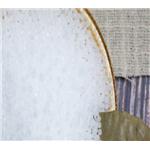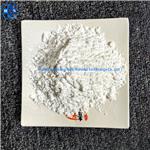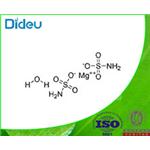Magnesium chloride hexahydrate is the hydrated form of magnesium chloride. Magnesium chloride is a mineral supplement used to prevent and treat low amounts of magnesium in the blood and a versatile compound with a number of uses in food preparation, health and personal well-being areas. Magnesium chloride is also used in road care, to synthesize other magnesium compounds, to remove dyes and industrial dye wastes, for the dust control, in the textile production, and as an industrial dye and dye waste remover. Magnesium chloride hexahydrate is used as catalyst for organic synthesis, e.g. 3,4‐Dihydropyrimidin‐2‐(1H)‐one. Magnesium chloride hexahydrate is also a promising heat/thermal storage material.
The pure form of the compound is a colorless monoclinic crystal, but industrial versions typically have a yellowish-brown hue. It has a salty and bitter taste and is deliquescent. It is easily soluble in water and ethanol and will decompose when heated in air, releasing HCl gas around 118°C, which turns into oxychloride. When heated at high temperatures, it decomposes into MgO and HCl.
Used in adjustment of ion strength.
- Magnesium chloride hexahydrate has been used in wash buffer for the purification of protein from Saccharomyces cerevisiae.
- It has been used for the preparation of extracellular (Ringer) solution for juxtacellular recording of single neurons in freely moving rats.
- It has been used as a supplement to study effect of desiccation on bacterial viability.
ChEBI: Magnesium dichloride hexahydrate is a hydrate that is the hexahydrate form of magnesium dichloride. It is a hydrate, a magnesium halide and an inorganic chloride. It contains a magnesium dichloride.
Magnesium chloride hexahydrate is a colorless, crystalline solid. On heating, it loses water of crystallization and affords magnesium oxide. It has been tested as a potential phase change material (PCM) for use in cooking indoors and during the low intensity solar radiation periods. Due to its suitable thermo-physical properties, it can be used as storage media in solar cookers. Its flame retardancy action on 100% woven cotton fabric has been investigated. Its heat capacity has been evaluated.
Pharmaceutical Applications
Magnesium Chloride Hexahydrate is often used in pharmaceuticals due to its high solubility. It is used to manufacture a range of medications that address various health concerns. It is also used as a source of magnesium in nutritional supplements. While it does not treat conditions by itself, it can help those with low magnesium levels improve certain bodily functions. In addition, magnesium chloride supplements have well-documented uses in type 2 diabetes, high blood pressure, osteoporosis, and migraines.
Magnesium chloride hexahydrate can be used as a firming agent, nutrient supplement, or flavor enhancer in various food and beverage products as an FCC-grade product. It plays a vital role in maintaining the product's overall quality.
This compound is used in various cosmetic and skincare formulations due to its beneficial properties. It can help absorb other nutrients in the skin and functions as a cleanser and purifier.
Aside from pharmaceutical and food uses, this compound also has industrial applications, such as in manufacturing fireproofing agents and cement, due to its unique chemical properties.
Crystallise it from hot water (3.3g/mL) by cooling. Dry it in a vacuum at ~175o, or heat the hydrate in a stream of HCl. When the hydrate is heated above 180o it is hydrolysed to the oxychloride (Mg2OCl2). It is deliquescent; store it in a well-stoppered vessel. [Bryce-Smith Inorg Synth VI 9 1960, Ehrlich in Handbook of Preparative Inorganic Chemistry (Ed. Brauer) Academic Press Vol I p 908 1963.]
[1] Radim Pilar, Ladislav Svoboda, Pavla Honcova and Lucie Oravova, Study of magnesium chloride hexahydrate as heat storage material, Thermochimica Acta, 2012, vol. 546, 81-86 DOI:
10.1016/J.TCA.2012.07.021[2] Guo-Lin Zhang and Xiao-Hua Cai, Magnesium Chloride Hexahydrate Catalyzed One‐Pot Synthesis of 3,4‐Dihydropyrimidin‐2‐(1H)ones Under Solvent‐Free Conditions, Synthetic Communications, 2006, 829-833 DOI:
10.1081/SCC-200050956[3] BH Tan, TT Teng and AKM Omar, Removal of dyes and industrial dye wastes by magnesium chloride, Water Research, 2000, vol. 34, 597-601 DOI:
10.1016/S0043-1354(99)00151-7
[4] Purification of Laboratory Chemicals DOI:
10.5860/choice.50-6768



